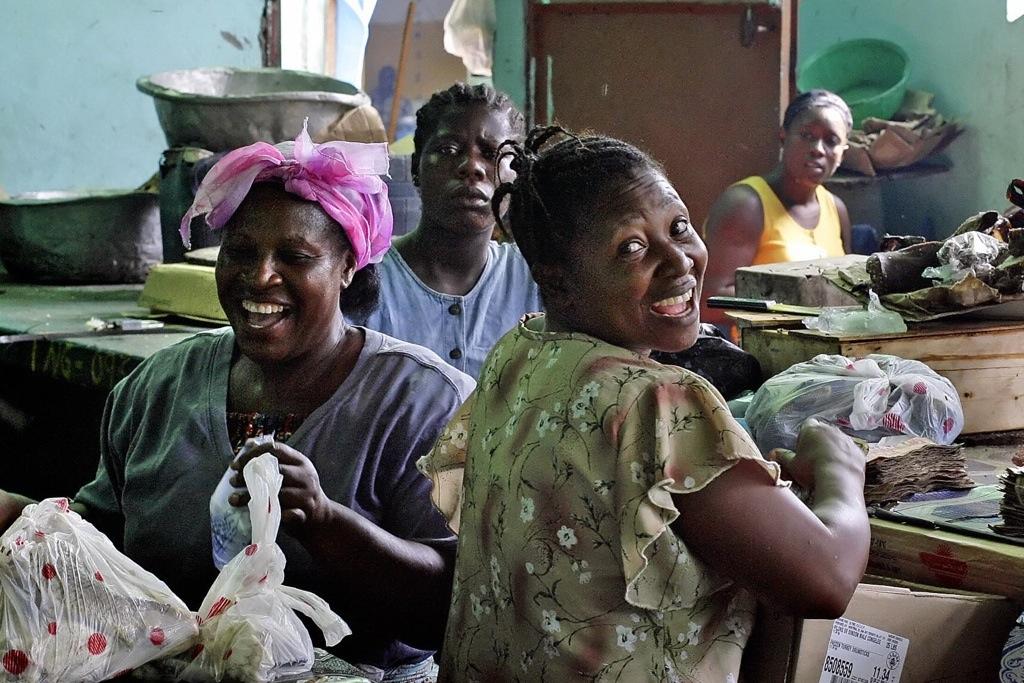Boosting Africa’s entrepreneurs
Vendors at the Waterside Market in Monrovia, Liberia. Informal markets and businesses make up a great deal of Africa’s economic activity.
BOSTON — Watch out Asia’s tigers. Make way for Africa’s lions, which are some of the world’s fastest growing economies.
Sub-Saharan Africa’s abundance of mineral resources and oil helped the continent weather the world’s economic downturn relatively well, growing by an average of 5 percent in the past six years, according to the World Bank. Of the world's 15 fastest-growing economies in 2010, 10 were from Africa, reports the IMF.
Key to boosting Africa’s development even further are entrepreneurs, from top financiers who attract multi-million dollar foreign investments, such as Michel Abrogoua in Ivory Coast, to fledging businesspeople struggling to launch enterprises, like Martha Partor in Liberia, whose food packaging operation battles to get sales of $100 per month.
Bustling markets in Africa's cities and traders selling tomatoes along every roadside show that Africans have a business sense that propels them to enter the world of commerce.
Africa’s fast-growing population means that young people are swelling the numbers of those seeking scarce jobs, according to a new African Economic Outlook report.
With almost 200 million Africans aged between 15 and 24, the continent has the youngest population in the world, and this number is expected to double by 2045, said the report. New jobs are urgently needed.
“The long-term perspective is good if African governments can effectively tackle the hurdles young people face,” said the report. Many of the young people will create their own jobs and even establish businesses that will employ others. These are Africa's new entrepreneurs.
"Entrepreneurship is not a new thing in Africa," Francis Chigunta, a lecturer at the University of Zambia, told GlobalPost. "According to historical accounts, Africans were big traders who covered long distances to sell their wares and buy items for exchange and resale in their home areas. However, it is only in recent years that systematic efforts are being made across Africa to promote entrepreneurship as a means of promoting growth and prosperity."
Chigunta, who served as an advisor to former Zambian President Rupiah Banda, emphasized that the "the major source of livelihoods in Africa" is the informal sector and small-scale operations. The informal sector's share of sub-Saharan Africa's GDP is about 40 percent and it provides about 70 percent of non-agricultural employment in the majority of African countries, said Chigunta.
"The overwhelming majority of new job creation in Africa is in the informal sector," said Chigunta, who added that the continent's entrepreneurs start in small trading businesses.
It would be great to say that Africa’s entrepreneurs are ‘doing it for themselves.’ But that’s not exactly the case. Work needs to be done to create conditions where emerging businesspeople can thrive. Governments must remove red tape restrictions, which are often holdovers from colonial times, such as cumbersome procedures to register a business, get a vendor’s license and open a bank account.
African entrepreneurs from South Africa to Rwanda say they need finance, especially microfinance that will loan to small-scale enterprises.
The need for better education is another common refrain. Ivory Coast is benefiting from a far-sighted government program that for more than 30 years has provided promising students with scholarships to study overseas. When the educated students return, the country’s economy benefits for years to come.
Related: Reviving the 'African miracle'
Better infrastructure — including a reliable supply of electricity, good roads and transportation — is the third ingredient that many African countries must provide to boost their entrepreneurs.
To help economies reduce their dependence upon raw commodities, entrepreneurs are manufacturing finished products for export. They are helped in this by new programs in the First World, such as the United States’ African Growth and Opportunity Act (AGOA), which is credited with opening the American market for many African products since it became law in 2000.
The World Bank’s “Ease of Doing Business Survey” shows these and other factors in 183 countries around the world. The country where it is easiest to do business is, not surprisingly, Singapore.
Nigeria is ranked at 13, South Africa 35, Rwanda 45, Liberia 151 and Ivory Coast is at 167. Rwandan President Paul Kagame's government is specifically using the markers in this survey to improve its business climate and has vaulted up the ranks in the past three years and aims to go higher.
The inter-relationship of these various factors is shown in GlobalPost’s interactive infographic.
The Global Economic Monitor measures total early stage entrepreneurial activity. One of its most interesting findings in Africa is that South Africa’s 9 percent rate of fledgling business activity is “far below the average of comparable economies around the world.” This is a “matter of grave concern,” said to the GEM’s 2011 report on South Africa, which urged steps to spur entrepreneurial activity.
Related: South Africa seeks an entrepreneurial revolution
"The potential for the development of entrepreneurship in Africa exists," said Francis Chigunta of the University of Zambia. "Although entrepreneurship offers great opportunities for prosperity and social advancement, many Africans are struggling to run businesses. African governments must strengthen their policy, legal and institutional environments in order to promote the development of entrepreneurship. Entrepreneurship has the potential to lift millions of Africans out of poverty."
![]()
We want to hear your feedback so we can keep improving our website, theworld.org. Please fill out this quick survey and let us know your thoughts (your answers will be anonymous). Thanks for your time!
